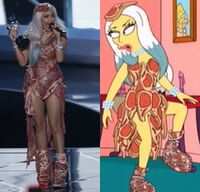
Lisa Goes Gaga/References
Wikisimpsons - The Simpsons Wiki
|
|||||||||
|
|
|
Cultural references[edit]
- The episode title is a pun on "going gaga" (a slang term for going crazy) and a reference to Lady Gaga's guest appearance.
- Many aspects of Gaga's career are referenced in the episode:
- When Lady Gaga arrives in Springfield, the crowd chant to the lyrics of "Bad Romance".
- The egg/vessel that Gaga arrived in at the 53rd Grammy Awards makes an appearance.

Comparison between Lady Gaga's meat dress and the Simpsons-ized version in the episode.
- Some of Gaga's famous outfits can be seen:
- The meat outfit from the 2010 MTV Video Music Awards.
- The "Living Dress" and the pyrotechnic leotard from The Monster Ball Tour.
- The Origami Dress.
- The Diamond Dress.
- The Bubble Dress.
- The Kermit the Frog Dress.
- Several Alexander McQueen designs.
- "Monster", a musical number specifically created for the episode, is a parody of Gaga's relationship with her devout "Little Monsters"—a phrase Gaga uses to refer to her fans.
- The song is a cartoonized version of Gaga's single "Born This Way".
- Gaga's Grammy Award winning single, "Poker Face", is played when Gaga's train first appears.
- During the end credits, Homer parodies the song and entitles it "Homer Face".
- Some of Gaga's famous outfits can be seen:
- Bart comments that if it weren't for awards shows no one would know that Glee is a comedy.
- Milhouse sleeps under his bed at night because he's afraid of the cars from the movie Cars.
- Gaga asks her stylist for the dress she wore for the Pope. When the stylist tells her he saw Jennifer Lopez wearing it the week before, Gaga orders him to burn it.
- During her song Lisa mentions NPR.
- Lady Gaga says, "So long, Springfield. You are my Waterloo." which means to encounter one's ultimate obstacle and to be defeated by it and comes from Napoleon finally being defeated and surrendering at the Battle of Waterloo.
Trivia[edit]
- When Lady Gaga flies over the crowd with sparks shooting from the points of her cone-cupped bra, Professor Frink holds up a calculator displaying "80085", which is "BOOBS" in calculator spelling.
- Lady Gaga wears 18 outfits in the episode.[1]
- Moe states he is half Armenian. Another mention of Armenia by Moe appears in the episode "Judge Me Tender", Moe mistakes American Idol for Armenian Idol. This implies Moe may have originated from Armenia, as in "Much Apu About Nothing" he was revealed to be an illegal immigrant. Also, in "Bart-Mangled Banner" Moe states that he's Dutch.
- Both the brass knuckle and the Nigerian prince scam were apparently invented in Springfield.
Continuity[edit]
- Maggie offers Lisa a pacifier. ("The Pacifier")
Goofs[edit]
- In the assembly, the boy sitting behind Bart has yellow hair. When Bart goes up to the stage to receive his award, the boy's hair is white.
- When Lady Gaga is looking for the person who's upset, the camera pans over the crowd. When the camera pans over to an area of the crowd in which Lisa is in, she is standing up looking at Lady Gaga. When the camera zooms in on her, Lisa has her head hanging.
- When Lady Gaga looks for the person upset, many people appear more than once.
- The "Just stamp the ticket" man doesn't appear in the flash mob until he corrects them on "disperse".
- When Lisa is pacing around in the treehouse, she is wearing a wristwatch on her left wrist, but after Homer calls her down to talk, it disappears.
References[edit]
